-
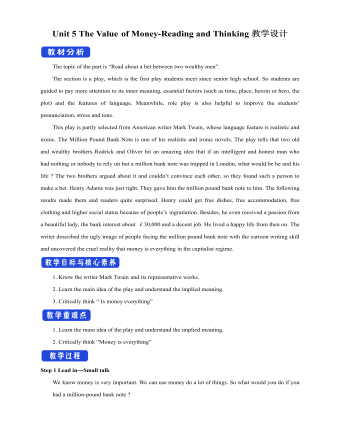
新人教版高中英语必修3Unit 5 The Value of Money-Reading and Thinking教学设计一
Everybody wants to get wealth.In today’s material world,making money or becoming wealthy symbolizes a person’s success and capability. Many people just make every effort, pay any price to attain greater wealth. With money,they can buy nice, large apartments in nice neighborhood. With money they can own luxurious cars. Wealth seems to bring all happiness in life.But is wealth the only road to happiness? Not really. There are many things in the world, which are beyond the means of money, such as friendship, love, health and knowledge. People are so preoccupied with struggling for money that they have no time or would not take the time to form or maintain friendship. What happiness can they feel living as lonely miserable creatures without love or friends in the world even if they accumulate tremendous wealth?In my opinion, people can’t do anything without money, but money is not everything. What money will bring you depends on your personal belief and goal in life. If you are kind enough to help others, especially the poor, money is a good thing to you. With it, you can do much more for the benefit of people and your country, and it will add to your own happiness. If you want money just for your own needs, you’ll never be satisfied or happy. In a word,you should have money spent for more people. Only then can money be the source of your happiness.Step 8 Homework4 students in a group, one acts Roderick, one Oliver, one servant and the fourth one acts Henry Adams, then listen to the tape, pay more attention to the difference between American English and British English in pronunciation, stress, tone.
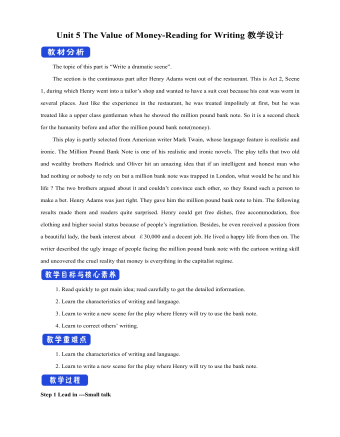
新人教版高中英语必修3Unit 5 The Value of Money-Reading for Writing教学设计二
2. 您能看到, 我头发太长了。You can see that my hair is much too long.3. 无论什么时候, 只要您想回来就回来。Please come back whenever you want.4. 您仅有很少的头发要理! You only have too little hair to cut !5. 为您服务是我的荣幸!It is my honour to serve you!Step 9 Writing(Henry is walking down the street when he sees a sign for a place that cuts hair. He decides to have it cut. )H=Henry B=BarberH: Good afternoon, I’d like to have my hair cut, if I may. (The barber looks at Henry’s hair and continues cutting another man’s hair. ) Er, I’d really like a haircut. As you can see it’s much too long. B: (in a rude manner) Yes, I can see that. Indeed, I can. H: Fine, well, I’ll have a seat then. (He sits in one of the barber’s chairs. The barber turns to look at Henry. )B: It’s quite expensive here, you know! Are you sure you can afford it?H: Yes. I think so. (After his hair is cut, the barber tells Henry how much he must pay. Henry shows the barber the bank note. )B: Why Mr. . . (looks shocked)H: Adams. Henry Adams. I’m sorry. I don’t have any change. B: Please don’t worry! (wearing a big smile) Nothing to worry about! Nothing at all! Please come back whenever you want, even if you only have too little hair to cut! It will be my honour to serve you!Step 10 Pair workExchange drafts with a partner. Use this checklist to help your partner revise his/her draft.1. Are all the elements of a play included and in good order ?2. Do the character use suitable language ?3. Are the stage directions clear and useful ?4. Is the plot clear and exciting enough ?
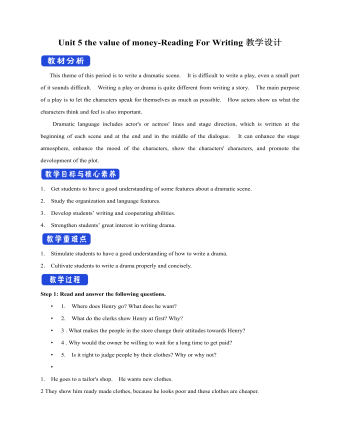
新人教版高中英语必修3Unit 5 the value of money-Reading For Writing教学设计一
【参考范文】Narrator:(Henry is smiling as he leaves the restaurant. As he is walking down the street, he sees a sign for a place that cuts hair. He decides to get it cut. )H=Henry;B=Barber;R=rude manH:Good afternoon, I'd like to get a cut, if I may. (The barber looks at Henry's hair and continues cutting another man's hair. )Er, I'd really like a haircut. As you can see it's much too long. B:(in a rude manner) Yes, I can see that. Indeed, I can. H:Fine, well I'll have a seat then. (He sits in one of the barber's chairs. The barber turns to look at Henry. )B:It's quite expensive here, you know!Are you sure you can afford it?H:Yes. I think so. (In comes the rude man. )R:Hey you there. I need a haircut quickly. Can you do me straightaway?B:All right, then, get in the chair and I'll see what I can do. R:Thank you. (sits down in one of the barber's chairs)H:Excuse me, but I was here first. Aren't you going to do my hair first?B:This man's in a hurry. H:Well so am I!I insist that you cut my hair first. B:OK, but I'll have to be quick. This gentleman is waiting. H:Thank you. (They both become quiet. After his hair is cut, the barber tells Henry how much he must pay. Henry shows the barber the bank note. )B:Why, Mr . . . (looks shocked)H:Adams. Henry Adams. I'm sorry, I don't have any change. R:You're that Mr Adams! Well,I'm glad I waited or I might never have known it was you. B:Why, Mr Adams, please don't worry!(wearing a big smile) Nothing to worry about!Nothing at all!Please come back any time, even if you only need too little hairs cut!It will be my honour to serve you!
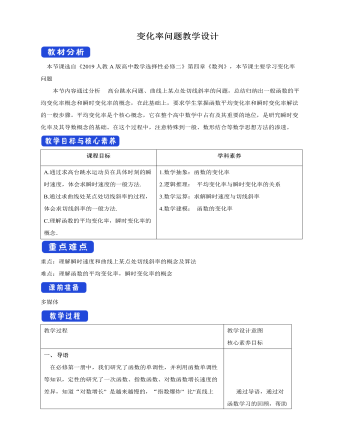
人教版高中数学选择性必修二变化率问题教学设计
导语在必修第一册中,我们研究了函数的单调性,并利用函数单调性等知识,定性的研究了一次函数、指数函数、对数函数增长速度的差异,知道“对数增长” 是越来越慢的,“指数爆炸” 比“直线上升” 快得多,进一步的能否精确定量的刻画变化速度的快慢呢,下面我们就来研究这个问题。新知探究问题1 高台跳水运动员的速度高台跳水运动中,运动员在运动过程中的重心相对于水面的高度h(单位:m)与起跳后的时间t(单位:s)存在函数关系h(t)=-4.9t2+4.8t+11.如何描述用运动员从起跳到入水的过程中运动的快慢程度呢?直觉告诉我们,运动员从起跳到入水的过程中,在上升阶段运动的越来越慢,在下降阶段运动的越来越快,我们可以把整个运动时间段分成许多小段,用运动员在每段时间内的平均速度v ?近似的描述它的运动状态。
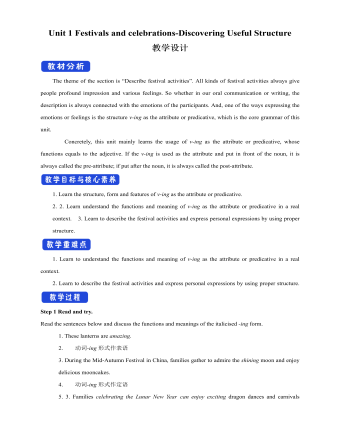
新人教版高中英语必修3Unit 1 Festivals and celebrations-Discovering Useful Structure教学设计
4.That was an experience that frightened everyone. →That was _____________________. 答案:1. taking 2. being discussed 3. in the reading room 4. a frightening experienceStep 6 The meaning and function of V-ing as the predicative动词-ing形式作表语,它通常位于系动词后面,用以说明主语“是什么”或“怎么样”一种表示主语的特质、特征和状态, 其作用相当于形容词; 另一种具体说明主语的内容, 即主语等同于表语, 两者可互换。The music they are playing sounds so exciting. 他们演奏的音乐听起来令人激动。The result is disappointing. 结果令人失望。Our job is playing all kinds of music. 我们的工作就是演奏各种音乐。Seeing is believing. 眼见为实。Step 7 Practice1. It is ________(amaze) that the boy is able to solve the problem so quickly.2. Buying a car is simply _______(waste) money. 3. Please stop making the noise—it’s getting ________(annoy). 4. complete the passage with the appropriate -ing form.La Tomatina is a festival that takes place in the Spanish town Bunol every August. I think many food festivals are __________ because people are just eating. however, this festival is _________ because people don't actually eat the tomatoes. Instead, they throw them at each other! the number of people ________ part in this tomato fight, can reach up to 20,000, and it is a very __________ fight that lasts for a whole hour. The _______ thing is how clean Bunol is after the tomatoes are washed away after the fight. this is because the juice form tomatoes is really good for making surfaces clean!答案:1. amazing 2. wasting 3. annoying4. boring interesting taking exciting amazing
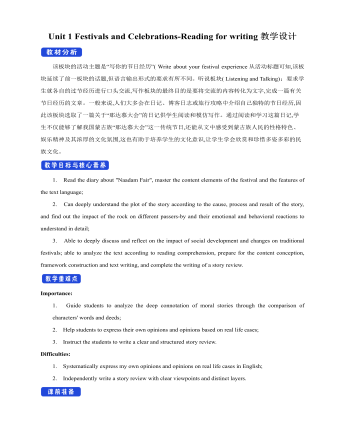
新人教版高中英语必修3Unit 1 Festivals and Celebrations-Reading for writing教学设计二
Step 3 Analyzing article structureActivity 31. Teachers raise questions to guide students to analyze the chapter structure of this diary and think about how to describe the festival experience. (1)What should be included in the opening/body/closing paragraph(s)?(2)How did the writer arrange his/her ideas?(3)What kind of interesting details did the writer describe?(4)How did the writer describe his/her feelings/emotions during the event?2. Students read and compare the three sentence patterns in activity 2. Try to rewrite the first paragraph of the diary with these three sentence patterns. After that, students exchange corrections with their partners. Such as:●This was my first time spending three days experiencing the Naadam Festival in China’s Inner Mongolia Autonomous Region and it was an enjoyable and exciting experience. ●I'll never forget my experience at the Naadam Festival because it was my first time to watch the exciting Mongolian games of horse racing, wrestling, and archery so closely. ●I'll always remember my first experience at the Naadam Festival in China’s Inner Mongolia Autonomous Region because it was so amazing to spend three days witnessing a grand Mongolian ceremony. Step 4 Accumulation of statementsActivity 41. Ask the students to read the diary again. Look for sentences that express feelings and emotions, especially those with the -ing form and the past participle. Such as:● …horse racing, wrestling, and archery, which are all so exciting to watch. ● some amazing performances● I was surprised to see…● I was a little worried about. . . ● feeling really tiredOther emotional statements:●I absolutely enjoyed the archery, too, but the horse races were my favourite part. ●I'm finally back home now, feeling really tired, but celebrating Naadam with my friend was totally worth it. ●He invited me back for the winter to stay in a traditional Mongolian tent and cat hot pot. I can’t wait!2. In addition to the use of the -ing form and the past participle, the teacher should guide the students in the appreciation of these statements, ask them to memorize them, and encourage them to use them reasonably in writing practice.
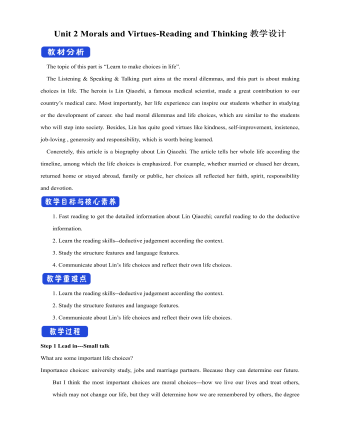
新人教版高中英语必修3Unit 2 Morals and Virtues-Reading and Thinking教学设计
The topic of this part is “Learn to make choices in life”.The Listening & Speaking & Talking part aims at the moral dilemmas, and this part is about making choices in life. The heroin is Lin Qiaozhi, a famous medical scientist, made a great contribution to our country’s medical care. Most importantly, her life experience can inspire our students whether in studying or the development of career. she had moral dilemmas and life choices, which are similar to the students who will step into society. Besides, Lin has quite good virtues like kindness, self-improvement, insistence, job-loving , generosity and responsibility, which is worth being learned.Concretely, this article is a biography about Lin Qiaozhi. The article tells her whole life according the timeline, among which the life choices is emphasized. For example, whether married or chased her dream, returned home or stayed abroad, family or public, her choices all reflected her faith, spirit, responsibility and devotion.1. Fast reading to get the detailed information about Lin Qiaozhi; careful reading to do the deductive information.2. Learn the reading skills--deductive judgement according the context.3. Study the structure features and language features. 4. Communicate about Lin’s life choices and reflect their own life choices.1. Learn the reading skills--deductive judgement according the context.2. Study the structure features and language features.3. Communicate about Lin’s life choices and reflect their own life choices.Step 1 Lead in---Small talkWhat are some important life choices?Importance choices: university study, jobs and marriage partners. Because they can determine our future.
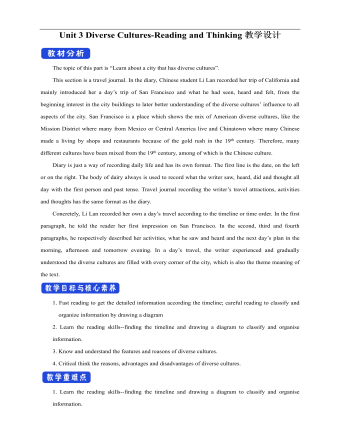
新人教版高中英语必修3Unit 3 Diverse Cultures-Reading and Thinking教学设计
Discuss these questions in groups.Q1: Have you ever been to a place that has a diverse culture ? What do you think about the culture diversity ?One culturally diverse place that I have been to is Harbin, the capital city of Heilongjiang Province. I went there last year with my family to see the Ice and Snow Festival, and I was amazed at how the culture as different to most other Chinese cities. There is a big Russian influence there, with beautiful Russian architecture and lots of interesting restaurants. I learnt that Harbin is called “the Oriental Moscow” and that many Russians settled there to help build the railway over 100 years ago.Q2: What are the benefits and challenges of cultural diversity ?The benefits: People are able to experience a wide variety of cultures, making their lives more interesting, and it can deepen the feelings for our national culture, it is also helpful for us to learn about other outstanding culture, which helps improve the ability to respect others. The challenges: People may have trouble communicating or understanding each other, and it may lead to disappearance of some civilizations and even make some people think “The western moon is rounder than his own.”Step 7 Post reading---RetellComplete the passage according to the text.Today, I arrived back in San Francisco, and it feels good (1) _____(be) back in the city again. The city succeeded in (2)_________ (rebuild) itself after the earthquake that (3)________ (occur) in 1906, and I stayed in the Mission District, enjoying some delicious noodles mixed with cultures. In the afternoon, I headed to a local museum (4)____ showed the historical changes in California. During the gold rush, many Chinese arrived, and some opened up shops and restaurants in Chinatown to earn a (5)_____ (live). Many others worked on (6)______ (farm), joined the gold rush, or went to build the railway that connected California to the east. The museum showed us (7)____ America was built by immigrants from (8)________ (difference) countries and cultures. In the evening, I went to Chinatown, and ate in a Cantonese restaurant that served food on (9)________(beauty) china plates. Tomorrow evening, I’m going to (10)__ jazz bar in the Richmond District. 答案:1. to be 2. rebuilding 3. occurred 4. that 5.living6. farms 7.how 8. different 9. beautiful 10. a
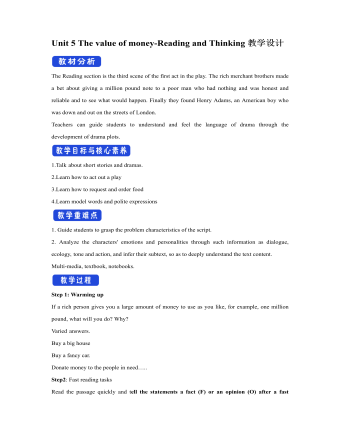
新人教版高中英语必修3Unit 5 The value of money-Reading and Thinking教学设计二
? Could you offer me some kind of work here?? I don’t want your charity, I just want an honest job.? Careless: I landed in Britain by accident.Step 7:Consolidation.? Find Henry? Roderick and Oliver were I .making a bet when they saw Henry, a poor young man. ? Know Henry? About a month ago, Henry was sailing and later he found himself carried out to sea by a strong wind. Fortunately, he 2.was spotted by a ship. And it was the ship that brought him to 3.England? Offer money to Henry ? Oliver and Roderick gave Henry a letter and told him that there was money in it. They 4.persuaded him to accept it, and made him 5.promise that it wouldn't be opened until 2 o'clock.Step 8:Language pointsa large amount of: a large quantity of; a great deal ofe.g. They bought a large amount of furniture before they moved their new house.make a bet: make an arrangement to risk money, etc. on an event of which the result is doubtful.e.g. We made a bet on the result of the match.permit sb to do something: allow somebody to do somethinge.g. My mother doesn’t permit me to ride in the street after it rained.by accident: as a result of chancee.g. I only found it by accident.stare at: look at somebody or something with the eyes wide open in a fixed gaze( in astonishment, wonder, fear, etc)to be honest: to tell you the truth; to be franke.g. To be honest, I don’t think we have a chance of winning.Step7 Homework:What do you think will happen to Henry? Will the bank-note help him or get him into trouble?
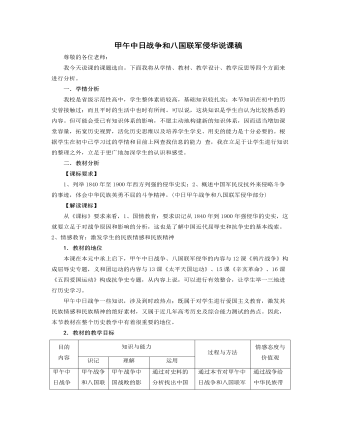
人教版高中历史必修1甲午中日战争和八国联军侵华说课稿
四.设计反思我在设计本课时,希望通过情境的创设充分再现历史,并利用多媒体辅助教学,破重点、化难点,让学生主动参与到学习过程中,从而突破狭小的教室空间,让学生真正做到感知历史,立足现实,展望未来。自主,交流、合作、探究是课程改革中着力倡导的新型学习方式。课堂教学中如何开展小组合作的探究学习存在着很多困难,首先是课堂教学时间有限,如何体现面向全体,给每个学生以机会?再次,历史问题的讨论只能依托于史料才能使讨论不沦为空谈,课堂上通过网络提供大量的史料(文字、图片或其他),势必不能有充分时间让学生阅读分析。如何解决这些问题呢?措施一:要形成较固定的历史学习合作小组。选定一位同学担任组长,负责协调措施二:要设置有利于学生探究的问题情境措施三:要把课堂教学与课外学习结合起来。在课前就印发相关的材料,或引导学生去查阅相关的资料,让学生有个充分的阅读、思考、交流的时间,是保证课堂上小组交流能成功实现的一个前提
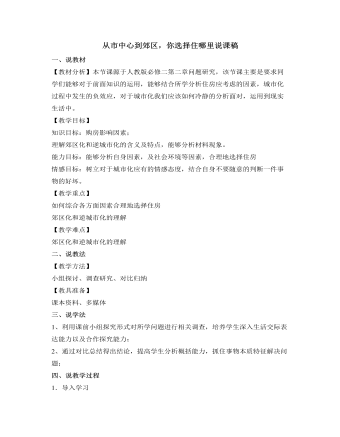
人教版高中地理必修2从市中心到郊区,你选择住哪里说课稿
课前活动:分成四组,对南京三个住房地段进行调查,新街口夫子庙、板仓、仙林,对住房居民进行问卷调查,自行设计调查问卷,分析该地段的房价要求,居民的要求,居民为何要在该地段购买住房,基础设施设置等等其它与居民购房有关的因素。◆设计意图:利用课前小组探究形式对所学问题进行相关调查,不仅让学生掌握知识了解知识来源于社会还能培养学生深入生活交际表达能力以及合作探究能力;3.问题设计同学们,不知道你们在调查过程中是否发现一个问题,郊区的房子,特别是别墅,都是些高档居所,许多有钱人的居住场所,那为什么会这样呢?伴随着城市化进程中居民都往城里挤,为什么还会有许多有钱人往郊区搬呢?这就是我们今天要研究的第二个问题:逆城市化。◆设计意图:承转过渡知识,从购房选择因素的学习过渡到郊区化的学习,同时培养学生发现问题的能力,给学生以启迪。
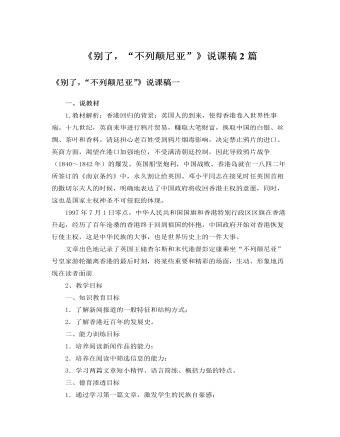
人教版高中语文必修1《别了,“不列颠尼亚”》说课稿2篇
一、说教材《别了,不列颠尼亚》是编排在人教版《普通高中课程标准实验教科书语文1(必修)》第四单元的课文,是精读课文《短新闻两篇》中的一篇,另一篇是《奥斯维辛没有什么新闻》。这一单元的学习内容是新闻和报告文学,还有两篇作品分别是中国报告文学三大里程碑之一的《包身工》和记录中国航天事业辉煌发展的《飞向太空的航程》。在当今信息大爆炸的时代,如何快速获得信息,如何在新闻中解读事件的真相,感悟生活的内涵成为语文教学的又一重大任务。因此这一单元的编入便更多地具有了时代意义,体现了语文学科与日常生活的密切关系。不仅如此,新闻特写和报告文学的选入,拓宽了学生对新闻类文章的了解,体现语文学科的工具性作用。在选文的过程中,新教材同时注重语文学科的人文性,四篇作品不仅传递着新鲜、真实的信息,同时更张显人文性的厚度,他们以饱满的情感,纵横的历史经验。
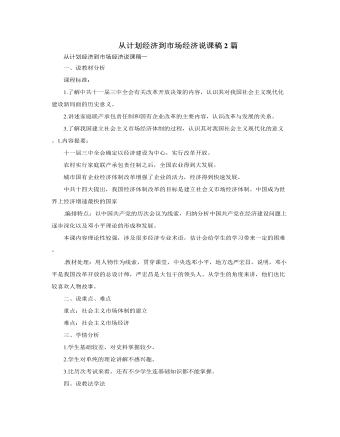
人教版高中历史必修2从计划经济到市场经济说课稿2篇
第一阶段政策性调整阶段管理体制高度集中管理体制政企分开,简政放权,扩大企业自主权所有制单一的公有制经济发展以公有制为主体的多种所有制经济分配制度平均主义以按劳分配为主的多种分配方式第二阶段制度创新阶段产权制度国有制实行以股份制为主要形式的现代企业制度问:无论是农村经济体制改革还是城市经济体制改革都取得了可喜的成就,具有深远的意义。那整个经济体制改革又有什么样的意义呢?学生回答:调动了------解放了------推动了------。总结:经济改革-------促进------社会发展 一个问题-------经济体制改革 两个方面-------农村、城市 三个意义-------农村、城市、经济老师讲授:改革不是一帆风顺的,它面临着复杂的国内外形势。但是,邓小平不愧是中国改革开放的总设计师,中国社会主义现代化建设的领路人。他冲破重重阻碍,南下上海、深圳等地视察,发表著名的“南方谈话”,建立起社会主义的市场经济体制,实现了经济体制改革的目标。投影显示:邓南下图片。“十四大”会场。社会主义市场经济体制建立的过程。
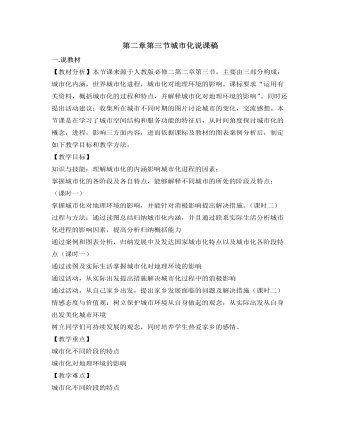
人教版高中地理必修2第二章第三节城市化说课稿
投影上海市的卫星城镇建设、交通改善图以及住房图等,探讨上海为解决城市化的问题做了哪些方面的工作?进一步引导思考总结对于城市化带来的问题,除了上海市的做法,你还有什么想法?◆设计意图:借上海的例子一方面引导学生解决问题的思路,让学生自己掌握城市化问题及措施,活跃思维;另一方面帮助学生树立学习优秀的意识;4.活动设计.未来展望——生态城市课本38页的活动,结合合肥市环城公园,解释生态城市。◆设计意图:进一步让学生认识到人地协调的重要性,牢固树立可持续发展的观念。5.活动设计分析南京的城市化过程中存在哪些问题,除了共性外,还有没有自己的个性问题?对于问题展开讨论,并提出相应的解决措施。◆设计意图:结合身边的地理,落实乡土地理的教育,激发学生热爱家乡,从身边的环境小事做起,落实环境教育。
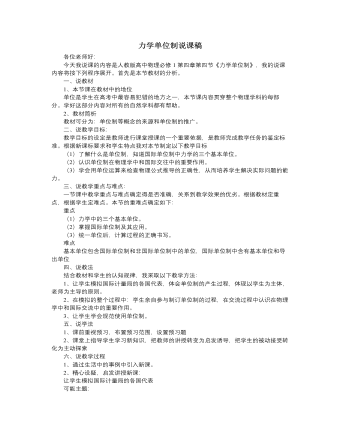
人教版新课标高中物理必修1力学单位制说课稿
今天我说课的内容是人教版高中物理必修1第四章第四节《力学单位制》,我的说课内容将按下列程序展开。首先是本节教材的分析。一、说教材1、本节课在教材中的地位单位是学生在高考中最容易犯错的地方之一,本节课内容贯穿整个物理学科的每部分。学好这部分内容对所有的自然学科都有帮助。2、教材简析教材可分为:单位制等概念的来源和单位制的推广。二、说教学目标:教学目标的设定是教师进行课堂授课的一个重要依据,是教师完成教学任务的鉴定标准。根据新课标要求和学生特点我对本节制定以下教学目标(1)了解什么是单位制,知道国际单位制中力学的三个基本单位。(2)认识单位制在物理学中和国际交往中的重要作用。(3)学会用单位运算来检查物理公式推导的正确性,从而培养学生解决实际问题的能力。
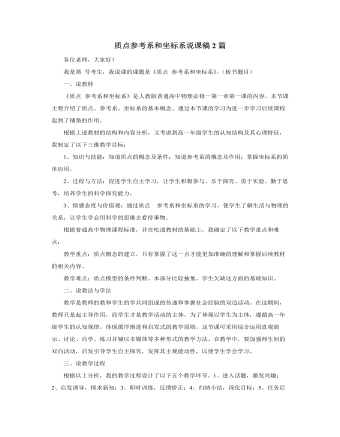
人教版新课标高中物理必修1质点参考系和坐标系说课稿2篇
一、说教材《质点 参考系和坐标系》是人教版普通高中物理必修一第一章第一课的内容。本节课主要介绍了质点、参考系、坐标系的基本概念。通过本节课的学习为进一步学习后续课程起到了铺垫的作用。根据上述教材的结构和内容分析,又考虑到高一年级学生的认知结构及其心理特征,我制定了以下三维教学目标:1、知识与技能:知道质点的概念及条件;知道参考系的概念及作用;掌握坐标系的简单应用。2、过程与方法:促进学生自主学习,让学生积极参与、乐于探究、勇于实验、勤于思考,培养学生的科学探究能力。3、情感态度与价值观:通过质点 参考系和坐标系的学习,使学生了解生活与物理的关系,让学生学会用科学的思维去看待事物。根据普通高中物理课程标准,并在吃透教材的基础上,我确定了以下教学重点和难点:教学重点:质点概念的建立。只有掌握了这一点才能更加准确的理解和掌握后续教材的相关内容。
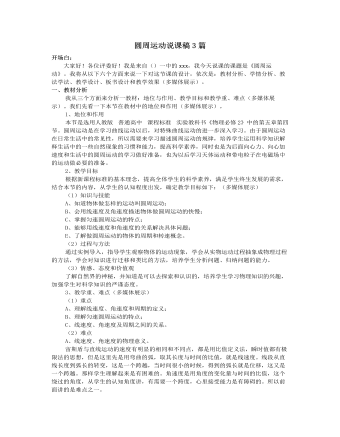
人教版新课标高中物理必修2圆周运动说课稿3篇
设计意图:通过设疑、讨论及学生的亲身体验与教师的引导,得到描述圆周运动快慢的两个物理量,也就成功的打破了学生在认识上的思维障碍,突破了物理概念教学的难点。在解决线速度和角速度的问题之后,我将引领学生学习匀速圆周运动的概念以及匀速圆周运动中线速度、角速度的特点。并引出匀速圆周运动中周期、转速的知识。为了加深学生对线速度、角速度与半径关系的认识,我设计了第三个学生体验活动:四名学生以我为圆心做圆周运动,四名学生始终并列,这时里圈同学走动不急不慢,而外圈同学则要小跑。通过学生的活动,不难发现在角速度相同的情况下,半径越大的线速度也越大。定性的得到了线速度、角速度与半径的关系。接下来让学生利用所学知识推导线速度、角速度与半径的关系。设计意图:这样就通过设疑、学生猜想、体验、推导的方式得到了结论,突破了本节课的难点即线速度、角速度与半径的关系。
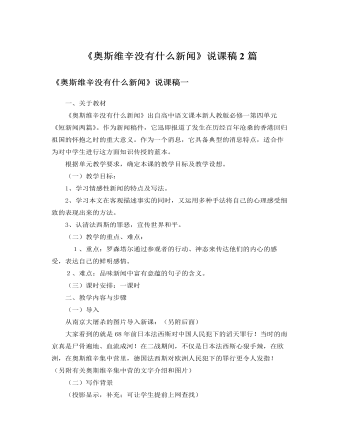
人教版高中语文必修1《奥斯维辛没有什么新闻》说课稿2篇
第11段很短,只点出了这是“在妇女身上搞不育试验的地方”,但在最末又加了一句“否则他会羞红了脸的”,这是为什么?那肯定是一个极为肮脏,极为残酷的地方。据资料记载:当时的希特勒制定一项令所有被征服或占领国家的民族充当奴隶并且逐渐消亡的隐密性种族灭绝计划——高效率、大规模的强制绝育。为此,数以百计的纳粹医生、教授、专家甚至护士,在行政管理专家的通力合作下,相继提出了几十种绝育方法,十余种实施方案,并且在奥斯维辛、拉芬斯布吕克、布亨瓦尔特、达豪等十多个大型集中营内对数以万计的犹太、吉普赛囚犯、因从事抵抗运动而被捕的政治犯和男女战俘进行了残酷的手术试验,造成他们大量死亡或者终身残疾、终身不育。这样残酷的毫无人性的手段,任谁也不愿看到。
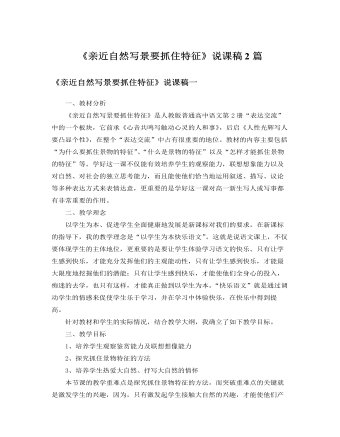
人教版高中语文必修2《亲近自然写景要抓住特征》说课稿2篇
我选取这两组例子的目的就是要学生在阅读对比中明白“横看成岭侧成峰。远近高低各不同”的道理。要让学生明白:看同一景物,观者所处的方位不同,角度不同,收到的效果也不同。最后教师明确:要写出景物的特征,首先得仔细观察,并注意观察点的变化。然后追问:抓住景物的特征还有哪些要求?让学生带着问题再来看多媒体出示的夜晚荷塘图和泰山松的有关图片,先让学生尝试描写,然后再出示《荷塘月色》和《雨中登泰山》中和图片有关的两段描写。这两段分别是:“曲曲折折的荷塘上面,弥望的是田田的叶子……仿佛远处高楼上渺茫的歌声似的。”(《荷塘月色》),“但是把人的心灵带到一种崇高境界的,是那些“吸翠霞而夭矫的松树……都让你觉得他们是泰山的天然主人,好象少了谁都不应该似的。”(《雨中登泰山》)。
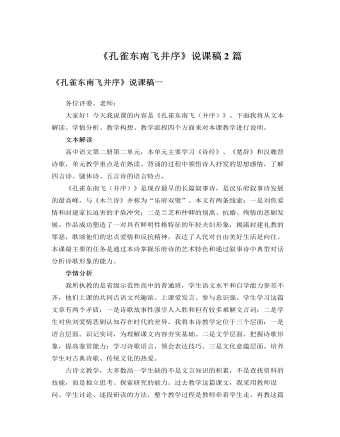
人教版高中语文必修2《孔雀东南飞并序》说课稿2篇
4、问题策略。引导学生提出问题、提出有价值的问题,是探究性学习的难点,也是课堂教学最有活力、最具创造力的亮点。我设计的课堂问题有:诗歌着力赞颂刘焦坚贞爱情和反抗精神,但他们许多地方却表现的非常顺从呢?焦母如此专横固执,为什么在焦刘悲剧发生后又要求合葬呢?这些由诗句生发的问题,会深深打动作学生的心灵,诱导学生去读诗,去背诗,去体味诗。5、手段方法。借助多媒体课件10个幻灯片、课文音频诵读资料、课文相关的文字资料,采用诵读法、讨论法、探究法等教学方法进行本课教学。6、板书设计:板书是教学内容的浓缩。根据教学重点和本诗特色,我的板书分预设和生成两块。预设板书设计有文章标题、情节结构、艺术特色三部分。文章标题孔雀东南飞情节结构被遣——誓别——抗婚——殉情——化鸟艺术手法①人物对话的个性化②铺陈排比的手法③起兴和尾声





















